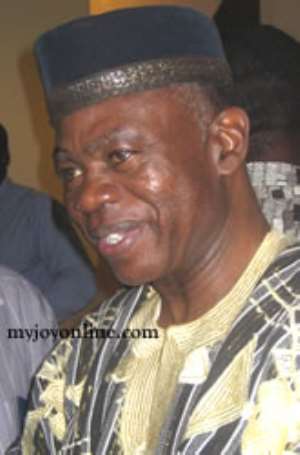
Ms Petra Maria Amegashie, running mate of the People's National Convention (PNC) presidential candidate, on Thursday criticized political parties contesting the December poll for lack of clear policies for the advancement, development and empowerment of women.
She said a PNC led government would create equal access for the participation in decision making of women in social, political and economic life of the nation and would legalize affirmative action.
Ms Amegashie said this during a dialogue for running mates of presidential candidates dubbed: “Women's Dialogue on Elections 2008.”
It was organised by Women in Law and Development in Africa as a platform for gender activists to interact with running mates of five political parties' presidential candidates.
They are Dr Mahamudu Bawumia of the New Patriotic Party (NPP), Mr John Dramani Mahama, of National Democratic Congress (NDC), Dr Abu Sakara Foster of the Convention Peoples Party (CPP), Ms Petra Maria Amegashie of the Peoples National Convention and Ms Patience Ameku of the Democratic Freedom Party (DFP).
Ms Amegashie said a government of Dr Edward Nasigrie Mahama, would create access for women to health care, quality education at all levels, career and vocational guidance, employment, equal remuneration, occupational health and safety, social security and public office.
A PNC government would strengthen the legal systems that would aim at eliminating all forms of discrimination against women, change societal attitudes and community practices against women by active participation and involvement of both men and women in gender sensitization.
Ms Amegashie urged the electorates to vote for the PNC to build and strengthen partnerships with civil society, particularly women's organizations, improve the legal system – make it more responsive and gender sensitive to women's needs, especially in cases of domestic violence and personal assault.
“New laws relating to marriage, divorce, ownership of property and inheritance will be enacted and existing laws reviewed to ensure that justice is quick and the punishment meted out to the culprits is commensurate with the severity of the offence,” Ms Amegashie said.
“Women's equality in power sharing and active participation in decision making, including decision making in political process at all levels will be ensured for the achievement of the goals of empowerment. My nomination as a running mate is the first step towards realization of affirmative action.”
Responding to questions on economic empowerment of women, poverty reduction and access to micro credit, Ms Amegashie said a PNC led government would establish new and strengthen existing micro-credit mechanisms.
She said micro-finance institutions would be encouraged to mobilize poor women and convergence of services, by offering them a range of economic and social options, along with support measures to enhance their capabilities so that all women below poverty line have easy access to credit.
The provision of support services for women, like child care facilities, including crèches at work places and educational institutions, homes for the aged and the disabled would be expanded and improved to create an enabling environment and to ensure their full cooperation in social, political and economic life.
Other gender sensitive measures of a PNC led government would include access to education by women and girls, eliminate discrimination, create a gender-sensitive educational system, increase enrolment and retention rates of girls and improve the quality of education to facilitate life-long learning as well as development of occupation, vocation, technical skills by women.
She said in recognition of the diversity of women's situations and in acknowledgement of the needs of specially disadvantaged groups, measures and programmes will be undertaken to provide them with special assistance.
These groups include women in extreme poverty, destitute women, women in conflict situations, women affected by natural calamities, women in less developed regions, the disabled widows, elderly women, single women in difficult circumstances, women heading households, those displaced from employment, migrants, women who are victims of marital violence, deserted women and prostitutes.
The Dialogue was moderated by Dr Esther Ofei-Aboagye of Institute of Local Government Studies and Ms Bernice Sam of Executive Officer of Women in Law and Development in Africa.




 Dumsor: Mathew Opoku Prempeh has been disrespectful, he should be fired – IES
Dumsor: Mathew Opoku Prempeh has been disrespectful, he should be fired – IES
 NPP prioritizing politics over power crisis solution — PR Strategist
NPP prioritizing politics over power crisis solution — PR Strategist
 E/R: Gory accidents kills 3 persons at Aseseaso, several others critically injur...
E/R: Gory accidents kills 3 persons at Aseseaso, several others critically injur...
 Nobody can come up with 'dumsor' timetable except Energy Minister – Osafo-Maafo
Nobody can come up with 'dumsor' timetable except Energy Minister – Osafo-Maafo
 Dumsor: You ‘the men’ find it difficult to draw timetable when ‘incompetent’ NDC...
Dumsor: You ‘the men’ find it difficult to draw timetable when ‘incompetent’ NDC...
 We’re working to restore supply after heavy rains caused outages in parts of Gre...
We’re working to restore supply after heavy rains caused outages in parts of Gre...
 NPP government plans to expand rail network to every region — Peter Amewu
NPP government plans to expand rail network to every region — Peter Amewu
 Dumsor must stop vigil part 2: We’ll choose how we demonstrate and who to partne...
Dumsor must stop vigil part 2: We’ll choose how we demonstrate and who to partne...
 2024 elections: NDC stands on the side of morality, truth; NPP isn't an option —...
2024 elections: NDC stands on the side of morality, truth; NPP isn't an option —...
 Akufo-Addo has moved Ghana from 'Beyond Aid' to ‘Beyond Borrowing’ — Haruna Idri...
Akufo-Addo has moved Ghana from 'Beyond Aid' to ‘Beyond Borrowing’ — Haruna Idri...
